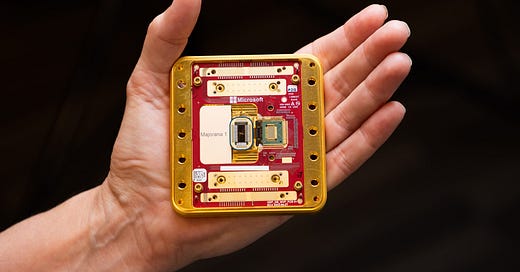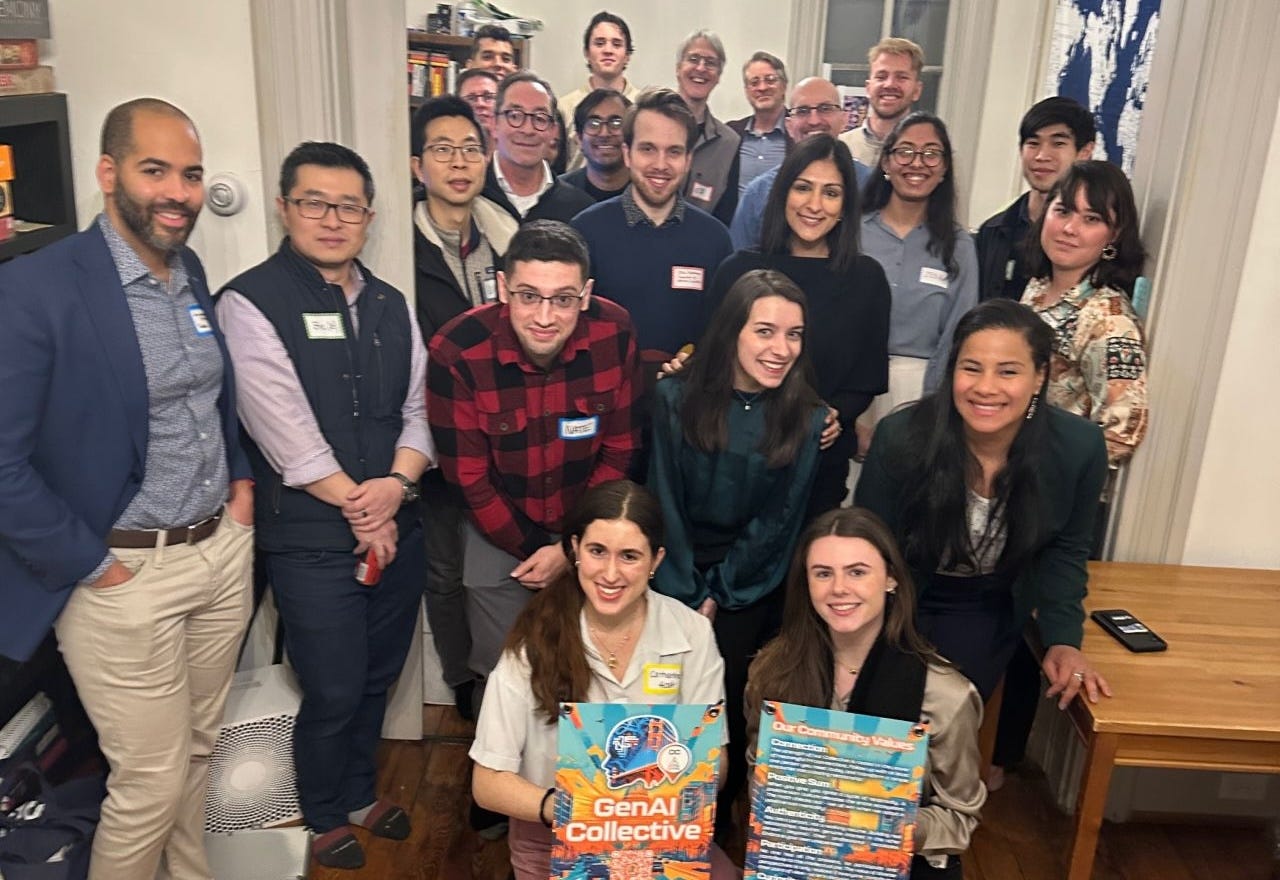🧠 A Week that Impacts Decades 🧠
The GenAI Collective Community Newsletter • Week of February 24th, 2025
Upcoming Events
🌁 SF Bay Area
[🔥2 SPOTS LEFT] Wed, Mar 5th: 🧠 GenAI Collective x Rho 💳 AI Agents Founders Dinner
Thu, Mar 6th: 🧠 Beta University x GenAI Collective 🧠 Shaping the Future of AI Infrastructure
Thu, Mar 13th: 🧠 GenAI Collective 🧠 Demo Night Marin!
Tue, Mar 25th: 🧠 GenAI Collective 🧠 Lunch & Learn
Wed, Mar 26th: SF Demo Night 🚀
🗓️ Hungry for even more AI events? Check out SF IRL, MLOps SF, or Cerebral Valley’s spreadsheet!
Our friends at the Silicon Valley Generative AI community (a member organization of the GenAI Collective) host biweekly meetings where they read and discuss the most disruptive, new AI/ML research papers! Join us for the next event on February 24th!
🗽 New York
[💥SOLD OUT] Thu, Feb 27th: AI/ML makers unplugged with Google Cloud
As part of the event, we’re inviting our community members to share their work in a short, 15-minute lighting talk. If interested, feel free to fill out this form for a chance to get involved!
The New York team is also hiring! We are seeking passionate enthusiasts to join us supporting event planning, sales and sponsorships, and marketing. Apply to Join the Team!
🌆 Chicago, IL
Sat, Mar 8th: ☕ GenAI Collective International Women's Day Brunch 🥞
☔ Seattle
🔥 Austin
Thu, Feb 27th: 🧠 GenAI Collective 🧠 Corporate by Day, Entrepreneur by Night
🎲 Las Vegas
Tue, Mar 11th: 🧠 GenAI Collective x HumanX 🎲 AI Leaders Convergence
🗻 Denver
Wed, Mar 12th: 🧠 GenAI Collective Denver 🧠 AI Tools & Networking
🇨🇦 Toronto
Thu, Mar 6th: Launching UofT | GenAI Collective Toronto Chapter!
Interview with Timescale AI’s Product Lead on Enhancing AI-Driven Databases
Interview with Timescale’s AI Product Lead on Enhancing AI-Driven Databases
AI Headlines: Week of 2/17
Helix: Revolutionizing Humanoid Robotics at Figure
Taken from Figure AI, February 22, 2025.
Figure AI captured headlines this last week with Helix, a groundbreaking Vision-Language-Action (VLA) model for humanoid robots, potentially transforming the field of embodied AI. The “generalist” model runs on low-power embedded GPUs for real-world applications, including household chores like sorting groceries to use in logistics and manufacturing lines.
Helix works by combining visual data and language prompts to control a robot in real time. It can process both visual inputs and voice commands simultaneously, allowing robots to respond to and execute tasks without relying on extensive pre-programming.
Helix's key technical advancements include:
Unified perception, language understanding, and learned control
Decoupled architecture with "slow" high-level thinking and "fast" real-time execution
Single neural network for all behaviors without task-specific fine-tuning
Figure AI, now valued at $39.5 billion after a recent funding round, terminated its partnership with OpenAI as of this month to focus on in-house technology. The company generated the VLA by collecting about 500 hours of high-quality, multi-robot, multi-operator dataset of diverse teleoperated behaviors.
As Helix continues to develop, it could significantly impact various industries, potentially reshaping human-robot interaction and the future of AI-powered robotics. However, experts note that while the demonstrations show impressive potential, there is cautious optimism about its applicability beyond controlled environments, and significant advancements are still needed before commercial deployment becomes a reality.
Microsoft's Majorana 1: A Quantum Leap in Computing?
Taken from Quantum Insider, February 22, 2025.
Microsoft has unveiled Majorana 1, the world's first quantum chip powered by a new Topological Core architecture, marking a significant milestone in quantum computing. This palm-sized processor features 8 qubits made from 'topoconductors', a new class of materials, with the company reportedly saying that it has the elements to scale to 1 million qubits in the future.
“Most of us grew up learning there are three main types of matter that matter: solid, liquid, and gas. Today, that changed,” Microsoft CEO Satya Nadella said in a post on X. “We believe this breakthrough will allow us to create a truly meaningful quantum computer not in decades, as some have predicted, but in years.”
Key applications of this breakthrough technology could include:
Solving the difficult chemistry problem of why certain materials corrode or crack
Calculating the properties of catalysts to sustainably break down pollutants or plastics
Harnessing enzymes to boost soil fertility and increase yields to eliminate global hunger
While NVIDIA CEO Jensen Huang said we are 20 years from practical quantum computing for enterprises, breakthroughs like this have the potential to speed up the timeline dramatically.
From Hype to Shutdown: Humane Acquired by HP
Taken from InvogueSolutions, February 22, 2025.
Humane, the Bay Area start up that raised over $230 million for its Ai pin, announced its shutdown and sale to HP on February 19.
Industry experts have called the shutdown as the “first high-profile startup flop of the artificial intelligence era.” Just under one year after the product’s November 2023 launch, and despite an initial valuation of $850 million, HP Inc. has reportedly acquired Humane’s assets and team for approximately $116 million.
Here’s a quick timeline of Humane’s historic rise and fall:
April 2024: Humane launches the AI Pin with significant hype
October 2024: Price dropped from $699 to $499
February 19, 2025: Humane announces shutdown
February 28, 2025, 12:00 PM PST: All Humane AI Pins will cease to function
Humane was founded by former Apple executives Imran Chaudhri and Bethany Bongiorno. Once named a Time magazine best invention of the year, the Ai Pin disappointed users who complained about malfunctions, its high price, and overheating problems.
Events Spotlight
🏛️ DC: AI Soirée and the Human Alignment Question
The first-ever GenAI Collective AI Soirée in DC brought together 20 attendees to explore one critical question: How do we align AI when we can’t even align ourselves? In an intimate setting, participants engaged in thought-provoking discussions on AI acceleration vs. safety, humanoid robots, artificial emotional intelligence, and humanity's increasing dependency on AI.
Key moments included a spirited debate between Wolf Ruzicka and Ed Melick on whether AI development should speed ahead or slow down. The consensus? There was none: except that these conversations are more necessary than ever. With curated roundtable discussions and reflections, attendees left with deeper insights and a renewed curiosity about AI’s societal role.
A huge thank you to our hosts and organizers: Nathaniel Burola, Anna D'Aprile, Liel Zino, Maxwell Stern, Pranav Velleleth, Kyra B., Rin Nguyen, and Samuel Li. More AI Soirées to come!
🌁 SF Bay Area: DeepSeek for Founders
No pitches, no buzzwords, just real conversations. The GenAI Collective's DeepSeek for Founders event in San Francisco provided a space for builders and problem-solvers to discuss how open-source AI can drive real impact. Hosted by Chappy and Mary in a stunning venue overlooking the city, the gathering felt more like a conversation among friends than a traditional startup event.
Founders broke into small groups to share strategies, lessons learned, and practical insights on integrating AI, reducing costs, and navigating the evolving landscape. The relaxed yet high-energy atmosphere fostered genuine connections and left attendees excited about what’s next.
🌆 Chicago: How AI Is Innovating the Physical World
Chicago’s AI community came together at mHUB for an electrifying discussion on AI’s impact on datacenters and robotics. Logan Chung and Shanu G. Mathew dissected how AI is reshaping datacenter demand, energy capacity, and infrastructure challenges, while Ed Colgate and Joe Mullenbach tackled robotics' biggest hurdles—the last millimeter problem and haptic intelligence.
The night featured dynamic panels, breakout sessions, and startup showcases, including innovations from Ganance, Fluid Reality, and Auvi Labs. Attendees left buzzing with insights on AI’s growing role in physical industries.
A special thank you to co-leads Jonathan Johnson-Swagel, Eric DeChant, and Mary Grygleski, along with our incredible speakers and hosts. If you missed it, keep an eye out for future mHUB events!
Partner Spotlight
Timescale: Redefining AI Integration for the Modern Developer
In an insightful conversation on the GenAI Collective podcast Collective Intelligence, host Thomas Joshi interviewed Avthar Sewrathan, AI Product Lead at Timescale. The discussion revolved around how Timescale is revolutionizing AI integration by extending PostgreSQL capabilities, eliminating the need for separate vector databases. Sewrathan detailed how PGVector Scale and PG AI are streamlining AI-powered data retrieval and enhancing developer experience.
Bridging AI and Databases During the interview, Joshi posed the fundamental question: “What challenges are developers facing when integrating AI with databases?” Sewrathan responded: “Developers need AI applications that provide reliable, accurate answers while avoiding the headache of managing separate systems.”
Joshi explored the limitations of vector databases, asking: “Why would developers prefer extending PostgreSQL rather than adopting a specialized vector database?” Sewrathan explained, “Managing a separate vector database requires additional infrastructure, synchronization, and learning a new query language. Our goal is to let developers use the tools they already know and love while minimizing infrastructure complexity.”
By extending PostgreSQL with PGVector Scale and PG AI, Timescale enables AI-powered applications to operate seamlessly within existing relational databases.
Key Offerings Timescale's latest innovations address major AI application challenges:
PGVector Scale – Enhances PostgreSQL’s vector search performance, handling billions of embeddings efficiently.
PG AI – Automates embedding creation and synchronization, reducing maintenance burdens.
Vectorizer – Ensures real-time updates, keeping applications up to date.
“These tools make AI integration smoother and more scalable without requiring developers to switch to an entirely new database,” Sewrathan emphasized.
By combining PostgreSQL’s stability with advanced AI capabilities, Timescale empowers developers to build scalable, AI-driven applications without unnecessary complexity. With PGVector Scale and PG AI, Timescale strengthens its position as a leader in AI-driven database solutions, paving the way for the next generation of AI applications.
Learn more about PG AI and subscribe to the Collective Intelligence podcast here.
Join the Community!
💬 Slack: GenAI Collective
𝕏 Twitter / X: @GenAICollective
🧑💼 LinkedIn: The GenAI Collective
📸 Instagram: @GenAICollective
Want to feature your insights? We’re always excited to hear from the community! ✍️
About Eric Fett
Eric leads the development of the newsletter and online presence. He is currently an investor at NGP Capital where he focuses on Series A/B investments across enterprise AI, cybersecurity, and industrial technology. He’s passionate about working with early-stage visionaries on their quest to create a better future. When not working, you can find him on a soccer field or at a sushi bar! 🍣
About Noah Frank
Noah is the co-founder of Aurix and has spent his career both working at startups and advising global leaders on innovation strategy. His work and body of research focus on AI policy, anticipatory governance, and effective decision-making. When not working to make emerging tech work for all, you can find him making music with his band.
About Aqeel Ali
Aqeel co-leads the newsletter for the Gen AI Collective. He’s the founder of Retentech AI, which helps ad supported publishers boost revenue with AI components focused on retaining site visitors for longer. When not immersed in AI, startup operations, or crafting satirical jokes, Aqeel “delves” into psychology and human creativity! 🎨













